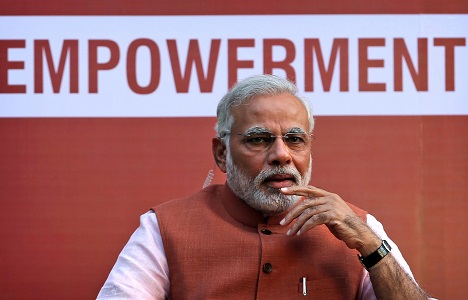Putin-Modi talks a success, but no ‘Triumph’
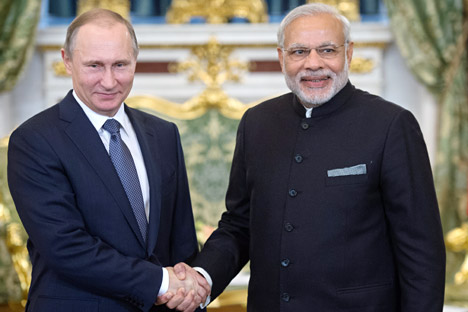
Russian President Vladimir Putin and Indian Prime Minister Narendra Modi meet in the Kremlin.
Sergey Guneev/RIA NovostiIndian Prime Minister Narendra Modi’s Moscow visit, on December 23-24, 2015, has added to the portfolio of bilateral intergovernmental agreements; 16 new strategic agreements were signed on cooperation in various fields. Among them were an agreement in the field of nuclear energy, in the production of hydrocarbons and geological surveys, agreements on cooperation in the construction of helicopters, on investment cooperation in the Russian Far East, and on technical cooperation in the railway sector.
The countries also signed a protocol amending a previous agreement on simplification of the visa regime for diplomats and businessmen; the need to simplify travel between the two countries has long been a demand by representatives of the business community.
“We have had excellent conversations over the past two days and very productive outcomes. It has deepened my conviction that this relationship truly meets the test of a special and privileged strategic partnership,” said Modi after the talks in Moscow. “We have laid the foundation of the future character of our strategic partnership,” he added.
Modi called Russia a prominent partner of India’s economic transformation. He urged Russian businesses to invest in various sectors of the Indian economy, to focus special attention on the “Make in India” programme, which aims to transform India into a global manufacturing centre.
The agreement on the joint production of the light multipurpose helicopters, the Ka-226T, signed after the summit meeting, will be the first major project in the defence sector within the framework of the “Make in India” programme, noted the Indian Prime Minister. The Russian partners in this project are Russian Helicopters and Rosoboronexport, while the Reliance Defence Company will be the Indian partner company.
Contrary to expectations, however, the two countries could not close the deal for India to purchase of five batteries of new generation anti-aircraft systems – the S-400 Triumph, which was estimated at being worth $4.5-7 billion. Negotiators failed to agree on a price for the anti-aircraft defence systems. This deal is important for India, given its vulnerability to rocket attacks from Pakistan and China. China became the first buyer of the newest Russian air defence system, the S-400, with the deal officially being announced in April this year.
On the eve of Modi’s visit to Moscow, analysts in India assumed that the countries would conclude several additional defence deals. These included the procurement of 48 Mi-18 helicopters, 150 BMP-2K armoured vehicles, and modernization of India’s aging fleet of IL-78s and IL-76s. It was also expected that India and Russia would sign final agreements for two diesel-electric submarines of Project 636 ‘Varshavyanka’ and three Project 11356 frigates, as well as a contract to lease the second Project 971 nuclear submarine.
In all sectors
Important decisions were taken in the field of nuclear energy and hydrocarbon cooperation during the meeting between Putin and Modi. The leaders discussed the launch of the second unit of Kudankulam NPP in India, due to happen soon, along with plans to build the third and fourth units. Negotiations to construct the fifth and sixth power units are on. They also discussed the allocation of another Indian site to build Russian-designed nuclear reactors.
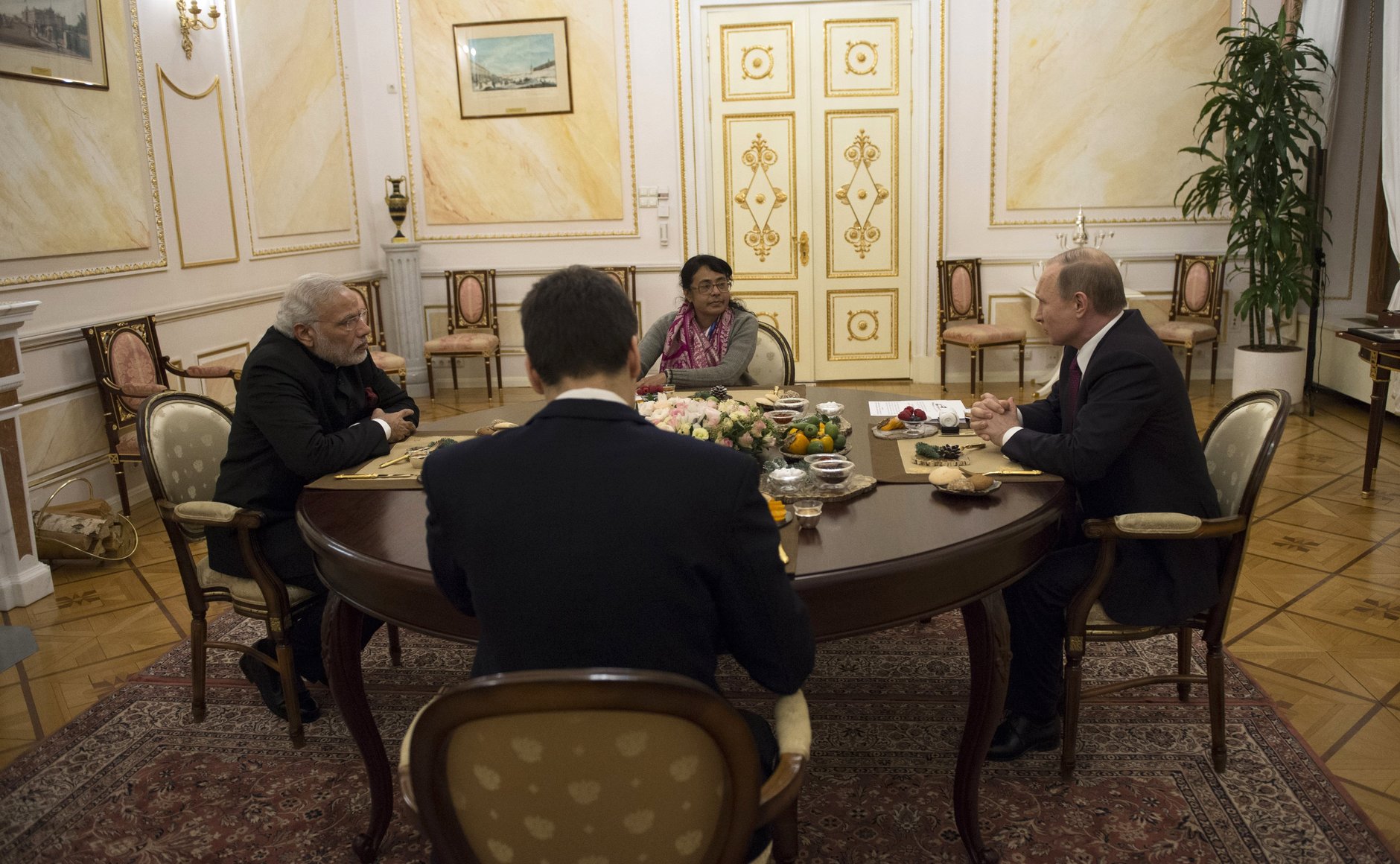 Source: Kremlin.ru
Source: Kremlin.ru
The plans of Russian hydrocarbon companies for cooperation with India were confirmed. An agreement between Rosneft and the ESSAR Group calls for supplying Indian refineries with around 10 million tons annually over 10 years. The Gazprom Company plans to expand its supply of liquefied natural gas and is currently developing several thermal and hydropower projects in India. The Power Machines Company has provided equipment for the hydro power plants Teri and Balimela, and the Konasima Thermal Power Plant. The company is currently building three new power units for the Sipat Thermal Power Plant.
The leaders noted the growing cooperation between the two countries in the diamonds production centre. According to Putin, almost half of the Russia’s rough diamond exports head to India. Modi said India has created a special zone to facilitate direct trade between the largest diamond producers in Russia and India.
Putin and Modi acknowledged the importance of developing new logistics routes to improve the profitability of trade between the two countries. One such route is the North-South International Transport Corridor, which will significantly reduce the cost and time of transporting goods from India to Russia, and in the opposite direction.
During a meeting with representatives of Russian and Indian business communities, attended by heads of major public and private corporations in the two countries, the Russian President admitted that between January and October this year, the trade turnover between the countries, which for many years has been very low, had further decreased by 14.4 percent.
“This is mainly due to lower energy prices and demand for engineering products, caused by unfavourable external conditions, and foreign exchange rate differences,” he explained, adding that the two countries have agreed to intensify efforts to bring bilateral trade onto a path of sustainable positive growth. Both governments have announced plans to increase bilateral trade to $30 billion annually, and the volume of mutual investments to $15 billion by 2025.
The President noted the intention of both countries to develop and diversify trade, work on reducing administrative and other barriers. He recalled that some Russian companies, including Rosatom, Gazprom, Russian Railways, Power Machines, Lukoil, AFK Sistema, Rosneft, and Renova, are already successfully operating in India. In December 2014, at the last bilateral summit in New Delhi, the Russian Direct Investment Fund (RDIF) agreed to make joint investments with Indian companies in infrastructure and energy projects, including production of clean energy.
“We are interested in having our Indian partners actively export their products into Russia,” said Putin. “We support the serious attitude of our partners on long-term fruitful work in Russia. We will do everything to make them feel comfortable in our country, and develop their businesses.”
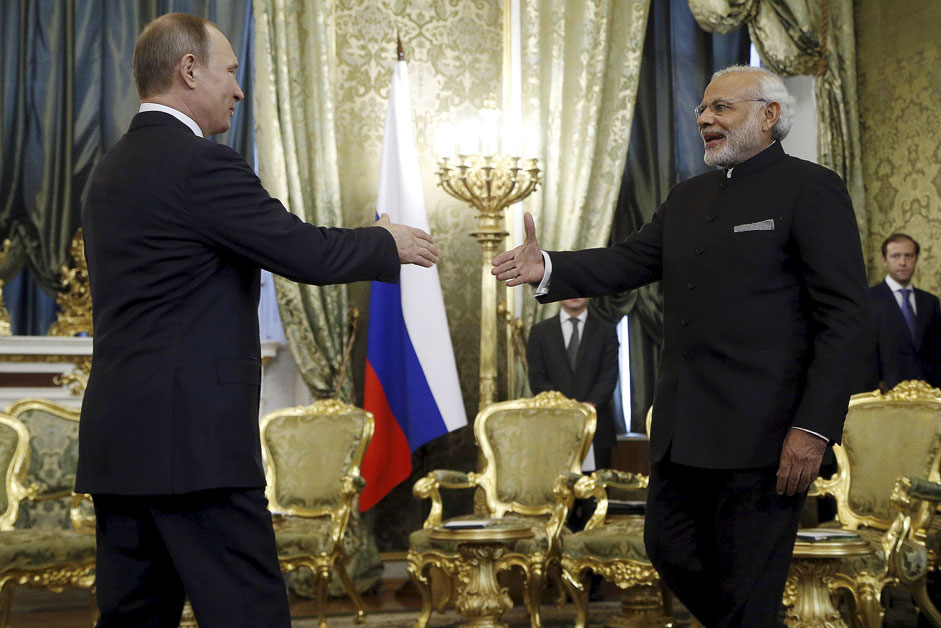 Source: Reuters
Source: Reuters
The Russian President mentioned the Kadima project, which is developing the production of pharmaceutical products in Yaroslavl Oblast. Most likely, he was referring to the company Cadila Pharmaceuticals Ltd, which indeed has declared similar plans.
Unfortunately, among the real-world examples of successful Indian investments, they did not mention projects such as Dr. Reddy’s Laboratories with the Russian R-Pharm Company to establish a scientific-industrial complex to develop and produce active pharmaceutical ingredients in Yaroslavl Oblast, investment projects of Pharmasyntez, which was created by the Indian company Vikram Punia in 1997. Also not mentioned was the project of the Advance Trading Company, one of the largest distributors of Indian products in Russia, which is being implemented in the Belgorod Oblast in collaboration with its Indian partner.
Business as usual
The 16th annual Russian-Indian Summit, held in Moscow, was very positive. Held parallel with the summit level negotiations, several large corporations signed new deals and partnerships.
The Reliance Defence Company, which is working on several Indo-Russian projects in the defence industry within the “Make in India” programme, including production of helicopters, submarines and ships, has signed an agreement with the company Almaz-Antey JSC.
According to a press statement issued by Reliance Defence, the two sides have decided to cooperate in the field of missiles and missile defence systems. The partnership involves both work on existing Almaz-Antey production systems in India, and cooperation in new defence products.
“Our proposed partnership will constitute an important milestone in the strategic relationship between the two countries,” said the CEO of the company, the billionaire Anil Ambani.
Within the framework of the bilateral summit, Rosnano OJSC and the Indian National Investment Infrastructure Fund agreed to work together to build a Russian-Indian investment fund to implement joint projects in the high-tech sector.
According to Rosnano’s press release, the partners will contribute $2 billion, in equal shares, and establish a common management company to implement high-tech projects at the growth stage, including dual-use technologies and products of the military-industrial complex.
“The creation of a joint private equity fund means moving to a new stage of development of relations, in these tough economic conditions of today’s global market. The fund is aimed at strengthening the competitive position of Russian companies, to promote the export of Russian high-technologies on the promising Indian market,” said Anatoly Chubays chairman of the board of directors of Rusnano.
During talks between Alexey Likhachev, Russian First Deputy Minister of Economic Development, and Shaktikanta Das, India’s Secretary, Economic Affairs, the National Immuno-Biological Company, which is part of the Rostec State Corporation, and the Serum Institute of India agreed to locally produce medicines in Russia at the Natsimbio Plant.
Full mutual understanding
During their two-day meeting, Putin and Modi displayed the importance of the “personal chemistry” between them. The Indian Prime Minister was the Russian President’s guest of honour at a private dinner; this gesture is not made for every political leader.
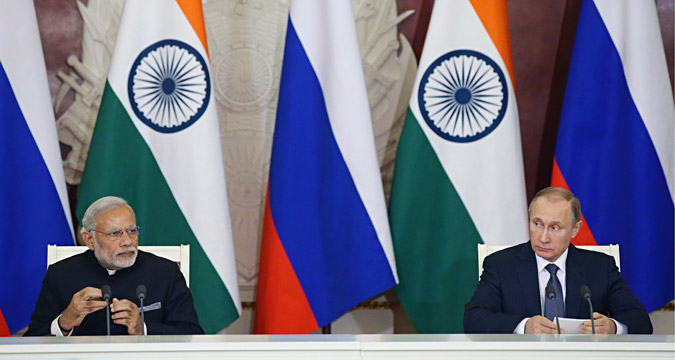 Source: Artem Korotayev/TASS
Source: Artem Korotayev/TASS
During the talks at the Kremlin, Putin noted that Modi’s visit was very timely, and a number of issues require special attention, especially in the current economic conditions. The Indian Prime Minister repeatedly praised the achievements of his Russian counterpart in the economic and geopolitical development of Russia. “You raised your country and the government to a new level. The world has great respect for Russia, and this is your personal achievement,” said Modi, referring to Putin.
The Indian Prime Minister repeatedly emphasized the strategic nature of the partnership and thrice expressed his condolences over the loss of lives in the terrorist attack on the Russian civilian aircraft over Sinai, and the tragic loss of the Su-24 in Syria, and assured the Russian president that India was mourning along with Russia.
After their summit, a joint statement entitled “Through trusting relationships – to new horizons of cooperation”, the leaders of Russia and India spoke about important geopolitical issues, including their support for the sovereignty, unity and territorial integrity of Syria.
“The parties have agreed that the internal armed conflict in the country has no military solution, and can only be resolved by political and diplomatic means – through substantive inter-Syrian dialogue without preconditions or external intervention, and on the basis of the Geneva communiqué of June 30, 2012, the Joint Statement after the multilateral talks on Syria in Vienna on October 30, 2015, and the Statement the “Syrian Support Group” on November 14, 2015,” the document noted.
“Russia supports further strengthening of India’s role in resolving global and regional problems,” Putin said in a statement to the press at the end of the Summit. “We believe that India, as a great power, is conducting a balanced and responsible foreign policy, and is one of the most worthy candidates for permanent membership in the UN Security Council.”
Russia and India have also “expressed strong support” for the Iraqi people and state authorities in their efforts to overcome the current crisis. The Ukrainian issue also made it into their joint statement – the leaders of the two countries assessed the progress made in the security sphere, including compliance with ceasefire conditions in the south-east of Ukraine.
All rights reserved by Rossiyskaya Gazeta.
Subscribe
to our newsletter!
Get the week's best stories straight to your inbox
